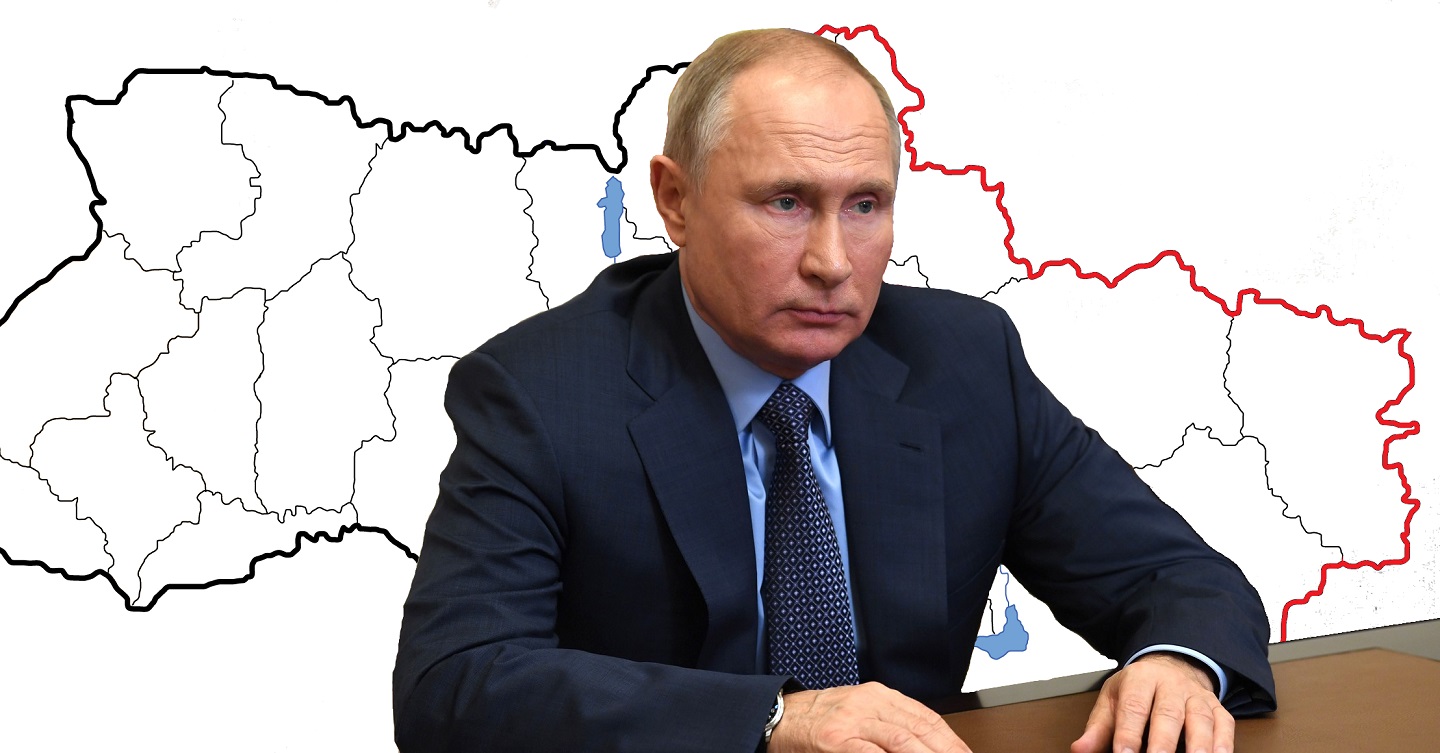
And I remember being surprised…one day to wake up with Russian paratroopers on the airport there in Pristina and it was clear to me that, we were getting something wrong about the Russians. That we just were misdiagnosing their motivations.
WAR ROOM isn’t a news outlet and we don’t do up to the minute reporting. But when Dr. Joel Hillison came to us last week and wanted to discuss the ongoing situation on the Ukraine border we happily welcomed him back to the podcast. Joel joins podcast editor Ron Granieri in the BETTER PEACE virtual studio to discuss what it takes to be truly effective deterring an adversary. It’s often easier to declare your enemy irrational, maniacal. or power hungry than it is to try and understand their motivation or point of view. Joel tries to apply strategic empathy (and years of NATO experience and study) to place himself in the shoes of Russian leadership to better grasp what is driving their thought process and actions. The goal is to determine what is important, what is threatening, what consequences are too painful, and where is there room to negotiate? At the time of this episodes release tensions are still high with limited hostilities continuing along the border and avenues of communication still open. Joel and Ron’s hope is that at the moment you listen to this episode the conversations are still ongoing, because the alternative is not good for anyone.
Podcast: Download
Joel R. Hillison holds the General Colin Powell Chair of Military and Strategic Studies. A retired military officer, with over 30 years of service, he spent three years in NATO and served as the Comptroller, Multinational Forces Iraq. He received his Ph.D. in International Relations from Temple University.
Ron Granieri is an Associate Professor of History at the U.S. Army War College and the Editor of A BETTER PEACE.
The views expressed in this presentation are those of the speakers and do not necessarily reflect those of the U.S. Army War College, U.S. Army, or Department of Defense.
Photo Credit: Photo courtesy of The Presidential Press and Information Office, Map by Aleksandr Grigoryev both via Wikimedia Commons





If the essence of the New/Reverse Cold War of today (a period of great power competition like the Old Cold War) is (a) “world revolution” (as advocated by the U.S./the West both at home and abroad; this, re: the political, economic, social and/or value changes demanded by such things as capitalism, globalization and the global economy) and (b) “world resistance to same” (as led, in this case, by such entities as Russia and China),
Then, accordingly, must not such matters as “honor, interest and fear” be considered from that exact such (“world revolution” versus “world resistance to same”) perspective?
After all, this such perspective seems to explain the “honor, interest and fear” matters/concerns that I present below; “honor, interest and fear” matters that — as you can plainly see — U.S./Western social conservatives and Russia seem to share:
“During the Cold War, the USSR was perceived by American conservatives as an ‘evil empire,’ as a source of destructive cultural influences, while the United States was perceived as a force that was preventing the world from the triumph of godless communism and anarchy. The USSR, by contrast, positioned itself as a vanguard of emancipation, as a fighter for the progressive transformation of humanity (away from religion and toward atheism), and against the reactionary forces of the West. Today positions have changed dramatically; it is the United States or the ruling liberal establishment that in the conservative narrative has become the new or neo-USSR, spreading subversive ideas about family or the nature of authority around the world, while Russia has become almost a beacon of hope, ‘the last bastion of Christian values’ that helps keep the world from sliding into a liberal dystopia. Russia’s self-identity has changed accordingly; now it is Russia who actively resists destructive, revolutionary experiments with fundamental human institutions, experiments inspired by new revolutionary neo-communists from the United States. Hence the cautious hopes that the U.S. Christian right have for contemporary Russia: They are projecting on Russia their fantasies of another West that has not been infected by the virus of cultural liberalism.”
(See the December 18, 2019, Georgetown University, Berkley Center for Religion, Peace and World Affairs article “Global Culture Wars from the Perspective of Russian and American Actors: Some Preliminary Conclusions,” by Dmitry Uzlaner. Look to the paragraph beginning with “Russia and the United States as screens for each other’s projections.”)
Bottom Line Thought — Based on the Above:
In the Old Cold War of yesterday — when the Soviets/the communists were doing “world revolution” and the U.S./the West (a) led the “resistance to same” effort and (b) employed the conservative elements of the world’s populations in this cause — President Ronald Reagan of the U.S. was not satisfied with simple “resistance” and/or “containment.” Instead, he wanted “roll back.”
As to this such observation, and re: the New/Reverse Cold War of today, should we not see Vladimir Putin’s efforts re: Ukraine (etc.) in this exact same such (a) “roll back” and (b) “honor, interest and fear” light?
Very well done
Based on the first paragraph of my initial comment above, you might ask: Why might the political, economic, social and/or value changes demanded by such things as capitalism, globalization and the global economy elicit a “world resistance to change” response?
If you did have such a question, then the following might help answer same:
“Capitalism is the most successful wealth-creating economic system that the world has ever known; no other system, as the distinguished economist Joseph Schumpeter pointed out, has benefited ‘the common people’ as much. Capitalism, he observed, creates wealth through advancing continuously to every higher levels of productivity and technological sophistication; this process requires that the ‘old’ be destroyed before the ‘new’ can take over. … This process of ‘creative destruction,’ to use Schumpeter’s term, produces many winners but also many losers, at least in the short term, and poses a serious threat to traditional social values, beliefs, and institutions.”
(See the book “The Challenge of the Global Capitalism: The World Economy in the 21st Century” by Robert Gilpin. Therein, see the very first page [page 3 in my copy] — of the very first chapter [the “Introduction” chapter] — of this book).
Thus, much like communism in the Old Cold War of yesterday, likewise with capitalism in the New/Reverse Cold War of today, such things as “traditional social values, beliefs, and institutions,” these are under constant and unending attack?
In “Cold Wars,” such as I describe above, can “honor, interest and fear” be “weaponized;” this, (a) by the party doing “containment” and/or “roll back;” herein, (b) working more “by, with and through” the more conservative elements of the world’s populations? As to this such question, here are two Old Cold War cases worth considering:
a. Nicaragua:
” ‘Blood of Brothers’ is a graphic account of a country torn in half over the Sandinistas’ efforts to build a new political and economic order. Early on, Mr. Kinzer saw that Sandinista policies were alienating ordinary Nicaraguans. In 1983 most Nicaraguans had still not fallen to the depths of deprivation and despair which they would reach in later years, but many were already unhappy and restive. . . . When the Sandinistas decreed that foreign trade was to be a state monopoly, they effectively declared war on these small-scale entrepreneurs. . . . [ And ] by trying to transform [ the existing system of food production ] so completely and so suddenly, they were underestimating the deeply ingrained conservatism of Nicaraguan peasants.” (See the April 7, 1991 New York Times article “The Sandinista Decade,” by Linda Robinson.)
b. Afghanistan:
“The overt attack on Afghan social values was presented, by the resistance forces, as an attack on Islamic values. This was also seen as an attack on the honor of women. The initiatives introduced by PDPA (the communist Peoples Democratic Party of Afghanistan) — to impose literacy on women and girls — inevitably raised questions as to the potential role of women outside the home. This provoked defensive actions from men, concerned with protecting the honor of women with their families, and to also ensure that traditional roles of women within the domestic sphere continued to be performed. It also generated fears that the important roles of women, as the primary vehicles for passing traditional and Islamic values from one generation to another, would be undermined if they were exposed to external and, particularly, non-Islamic values. This enabled the exiled radical Islamic parties to claim leadership of the resistance and to also declare a jihad.” (Item in parenthesis above is mine. See the book “Afghanistan Aid, Armies and Empires,” by Peter Marsden; therein, see Page 58, in Chapter 4 entitled “The Soviet Military Intervention.”)
As we all know, the U.S./the West did, indeed, and as part of our “containment” and “roll back” strategies back-in-the-day, “weaponize” the “honor, interest, and fear” concerns of the conservative elements of both Nicaragua and Afghanistan (etc., etc., etc.).
Vladimir Putin, being on the receiving end of this such “weaponizing” of “honor, interest and fear” during the Old Cold War — and watching the U.S./the West exploit same in the name of “containment” and “roll back” back then — surely finds himself in a much better (and, indeed, a reversed and revengeful?) position today.
This, given that now, in the New/Reverse Cold War of today, it is the U.S./the West that has become the entity seeking to “transform” the world. (In this regard, look no farther than the U.S./the West’s efforts re: “girls schools,” etc., in Afghanistan, and elsewhere, in recent decades?)
As a final thought here, let me try (and probably fail miserably) to take on the issue of deterrence:
In this regard, given the foundation that I have attempted to provide above, let us consider the matter of “deterrence” from the perspective of:
a. The U.S./the West, post-the Old Cold War, seeking to “transform the world;” this, so that same might be made to better interact with, better provide for and better benefit from such things as capitalism, globalization and the global economy. (This requiring, in some places more than others, significant political, economic, social and/or value change.) And from the perspective of:
b. Such nations as Russia seeking to (a) prevent these such transformations from occurring (especially in Russia’s backyard/its sphere of influence and/or (b) seeking to reverse any such transformations that have already been occurred.
From those such perspectives, consider the following, which may be from an era which, in certain ways at least, might be similar to our era today:
“Why are we bent on forcing upon them a civilization not suited to them, and which only means, in their view, degradation and a loss of self-respect, which to them is worse than the loss of life itself? … The commercial instinct which seeks to furnish a market and places for the growth of commerce or the investment of capital for the money making of the few is pressing this country madly to the final and ultimate annexation of these people — regardless of their own wishes.”
(http://nationalhumanitiescenter.org/pds/gilded/empire/text7/tillman.pdf)
As you can see from the link provided, the above speech was given by Senator Benjamin R. Tillman of South Carolina; this, regarding the possibility of the U.S. going to war with the people of the Philippines after the end of the Spanish-American War. (Tillman, being alive during the American Civil War, probably knew what he was talking about was talking about here?)
Bottom Line Question — Based on the Above:
Based on the “honor, interest and fear” quotation from Senator Tillman above, how does one “deter” a people from fighting against the imposition of “a civilization not suited to them, and which only means, in their view, degradation and a loss of self-respect, which to them is worse than the loss of life itself?”
Good discussion. If the topic remains “deterrence,” then I would offer that the strategic context should be reviewed in concrete as well as theoretical terms. We know how deterrence worked (past tense) with respect to USSR, from Stalin through Putin. Deterrence can, and I maintain was, from time to time dissected though in the CW. That is, one can take various kinds of military operations, be they demonstrations or even small scale contingency operations with combat power applied, and not approach the ‘strategic deterrence’ that was maintained, when the two sides each had no interest in a nuclear exchange. I would offer up for historical examples that the entire engagement and war in Korea was one example, as was the Vietnam war. Harry Summers book touched on that very well, as I recall. So the idea that once an attack begins deterrence is over is not, on its face, valid, in my mind. Obviously, though, if one applies loose terms or even muddled thinking at the beginning of a crisis so as to confuse ends, ways, and means, or even worse, to not go to the trouble of distinguishing those major components of strategy, then one should expect a lot of debate later on as to what the objectives, for the US, in fact are. We, the US should never forego the opportunity to lead or even drive the factors by selecting what we intend to deter. In this case, my opinion is that we, as part of NATO deter Russian expansion. Among the tools we should apply are in fact military in nature. This audience of course knows what the military means might be. Long range capabilities, air and space domain, and various other means, in addition to land operations, again, once the NCA has made clear what the objectives are.
When John Bonin and I crafted a Land Warfare Paper shortly after the operations in GWOT began, we offered a concise history of how the US has successfully applied what we called “Continuous Concentric Pressure” (the title of the LWP.). We highlighted George Kennan’s “Mr. X” paper. We wrote, “Perhaps the most comprehensive yet concise description of teh “Cold War Grand Strategy” of continuous concentric pressure are George Kennan’s Mr. X article in Foreign Affairs July 1947 and NSC 68: Forging the Strategy of Containment of 7 April 1950. One key characteristic of this strategy was patience. The military would continually contain and contest communism wherever it threatened. When combined with diplomatic, economic and cultural pressures, military pressure contributed to the decline and then the collapse of the Soviet Union….”
A common thread in the deployment of forces for either deterrent operations or for combat operations is that sometimes it is wise to not expend force, but to await the enemy’s expending of it, and select or craft an agile strategy at the theater echelon, so that the national echelon maintains its options to apply national power when and where it will achieve the national objectives we seek. The selection of the ends is not sufficient, but essential to the distinction of the ends, ways, and means. Thank you for the excellent offering of the topic in this way.
I think the question of communication looms very large in the preent circumstances. Has the West been listening to Putin carefully enough to identify his “fear, honor, and interest”? Certainly he has had plenty of opportunity to listen to and analyze the West, and, as chess champion Kasparov has pointed out, he has correctly identified chinks in the NATO alliance, and reticence in Western intentions. He knows that our leaders are conflict avoiders. Did we take the trouble to hear and analyze his statements, or, better, to have a dialogue with him? By now it must be painfully obvious to all that the Western nuclear arsenal is NOT a deterrent to limited war, and probably not even to nuclear war, if this can be judged from Putin’s recent threats. It was easy to diagnose him as a aberrent, unbalanced; it would have been more productive to figure out how he has come to this position, and therefore what might deter him. It’s an excellent podcast. The comments above on forms of government seem spot on to me. Athens was a democracy; Sparta was not. I hope our leaders remember how the Pelopponesian War turned out. We in the West are the Athenians, so we would be well advised to think carefully.